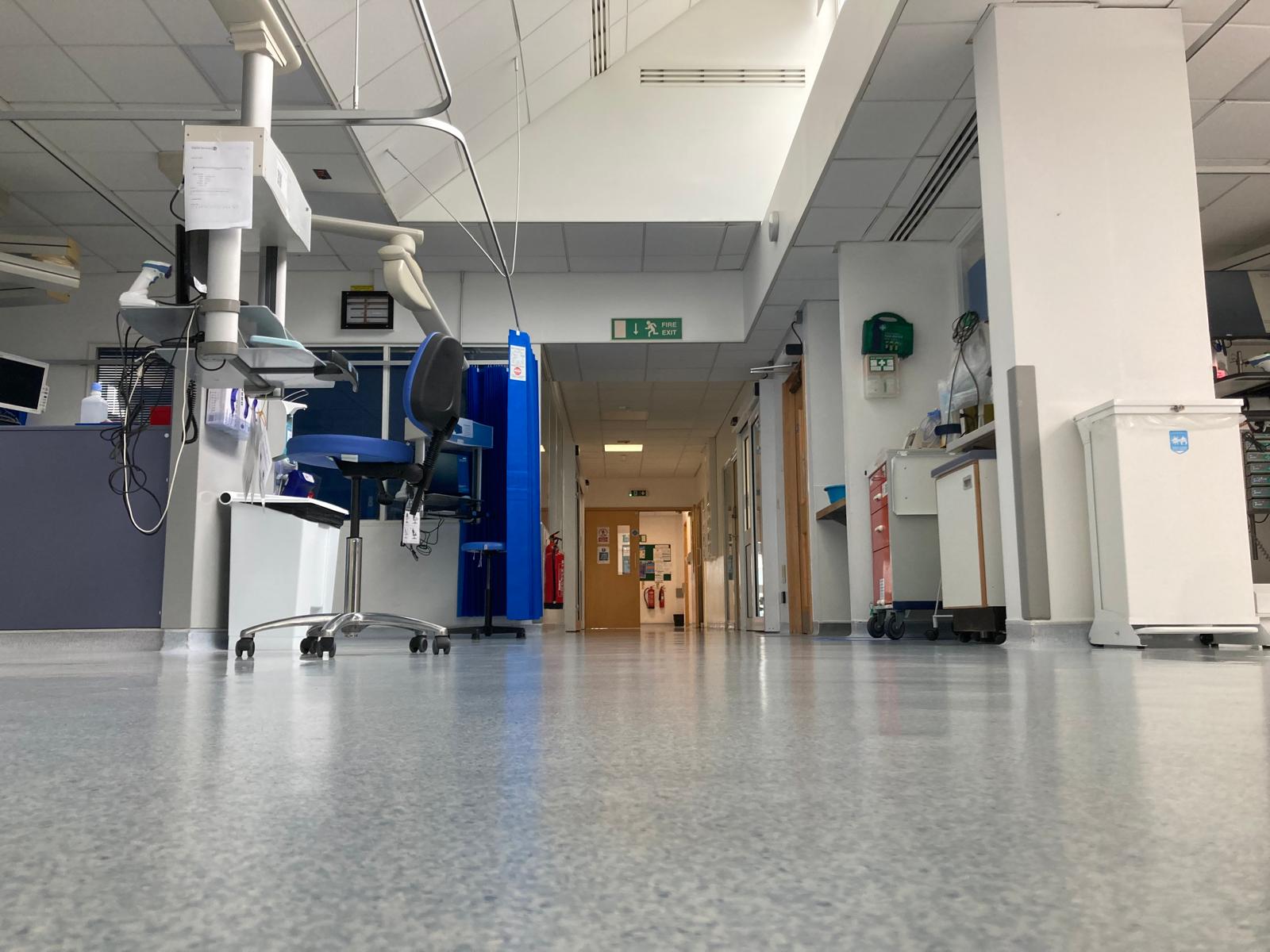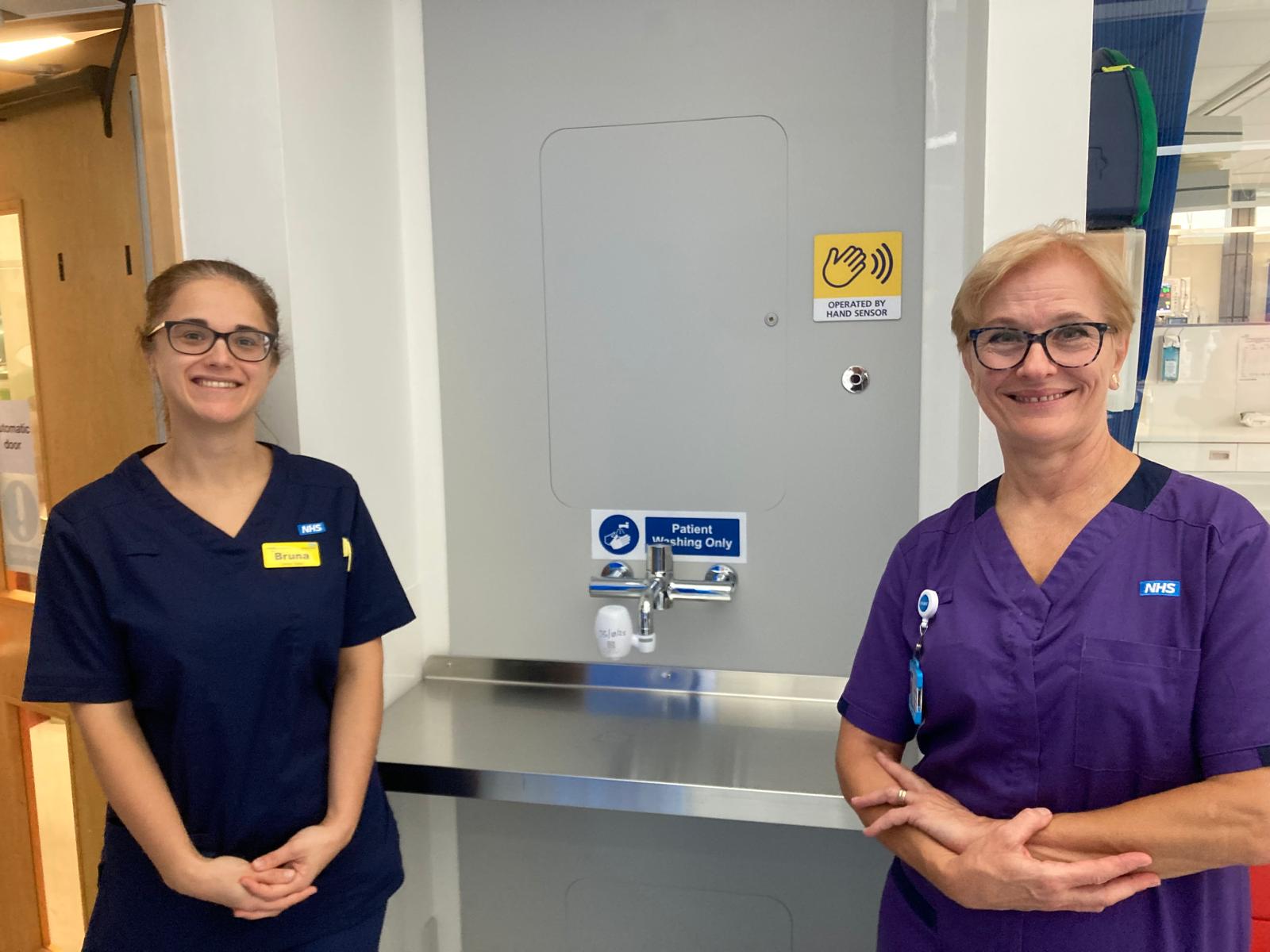

05:00PM, Wednesday 08 October 2025

Wexham Park Hospital is 'leading the UK' in a fight against drug-resistant bacteria.
“The threat that we're facing, it's often termed the silent pandemic,” said Dr Manjula Meda, a microbiologist and infection control doctor at Wexham Park Hospital.
It is a quiet Tuesday morning in the hospital’s Intensive Care Unit (ICU). But, behind the hum of air conditioning and soft beep of machinery, a war is being waged against an invisible enemy.
Superbugs - powerful drug-resistant bacteria - are on the rise globally, and an outbreak of one, called CPE, has been ongoing at Wexham Park since mid-2023.
New strategies must be deployed where conventional medicines have been made redundant, and Dr Meda has spearheaded a project to adapt the Slough hospital’s ICU for the fight.

Wexham Park has the UK's first 'water safe' ICU, NHS Frimley Health Foundation Trust says
The battleground is the water systems; ‘super highways’ where superbugs spread through pooled water in drains, splashes at sinks, and old underground piping.
Wexham Park Hospital is now ‘leading the UK’ in anti-microbial resistance strategies, according to the NHS trust running it. It said the hospital’s ICU is the first in the UK to adopt a new ‘water safe’ strategy.
New measures at the hospital, rated ‘outstanding’ in the latest regulator inspection, are being looked at for the next generation of UK hospitals built through the New Hospital Programme.
“There is an alternative method, through the built environment, to combat these bugs,” Dr Meda told the Advertiser. “It is possible to overcome what is actually a relentless increase [in cases].”
She added: “I think what we've shown here is that it can be reversed and hospitals, being powerhouses for these bugs, are where we need to control it.”

NHS Frimley Health's infection control doctor Manjula Meda
Upgrades in the ICU, where the hospital’s most vulnerable patients are treated, have seen sinks and drains ripped out and remodelled through a near £240,000 project.
Door handles have been replaced with sensors and underground piping reworked, as part of the changes designed to curb the spread of infectious bacteria through water.
The outbreak of CPE [carbapenemase-producing enterobacterales] at Wexham Park was declared in July 2023, where high numbers of cases were found in cancer wards and the ITU.
CPE can live harmlessly in a person’s gut, though they can cause hard-to-treat infections if they get into blood, urine or open wounds. Infection can be fatal in the most serious cases.
NHS Frimley Health Foundation Trust launched an investigation which cited problems with the hospital’s drains acting as ‘super highways’ for the infectious bacteria’s spread.
The outbreak is still ongoing, Dr Meda said, but since the introduction of the new ‘water safe’ strategies and increased patient testing, there has been a reduction in cases.
“You cannot manage an outbreak without having good data that support your outbreak investigation,” Dr Meda said.
“When we started doing that [more testing], we started to detect 10 times more cases than we were originally.”
Dr Meda added: “We now know that these bugs have become established in our drainage systems, and we are now transmitting these bugs in our hospitals.
She said the outbreak was still ongoing, due to the increased patient testing.
Dr Meda continued: “Our screening strategy had to change to reflect that - and therefore, our outbreak continues."
Asked whether Wexham Park was ‘on the frontlines of the superbug fight’, Dr Meda said ‘yes’.
“We’re not just safeguarding our patients,” she added.
“There's hospitals around the world learning from here - and good things happening.
“Many countries have visited our hospital to have a look at what we've done, as well as many hospitals in the NHS.”

ICU nurses Bruna Pitaes (L) and Carmen Nagy
For ICU staff, the changes affect regimented routines like hand-washing, now often done with hand-sanitiser. Its use is recommended even after hand-washing in a sink.
Changes will affect the patients too. In the shower, drains have been moved so patients do not stand on top of them.
There are sixteen beds in the ICU, which previously had an individual sink next to them which have now been removed.
Nurse Carmen Nagy said: “Most of the equipment will be stored near the patient, close to a patient bed, where the sink is.
“If the sink is non-compliant, if the flow of the water runs straight into the drain, there will be about two metre splash area.
“All those microorganisms from the wastewater would be landing on equipment, on bed spaces - even on the patients if they are really close to that sink.”

Cheryl Callow beside the ICU's air filter system, which helps combat infectious spread.
Cheryl Callow, senior capital project manager at NHS Frimley Health, said the ICU revamp – at a cost of around £240,000 – was ‘good investment’.
NHS Frimley Health has also unveiled a plan to invest more than £50million to modernise Wexham Park.
“Predominantly, this is about prevention in terms of infection for patients,” Ms Callow added.
“But the long-term goal here is to help us maintain our systems, our drainage systems.
“Cost savings up against the project, in a year's time we'll be able to look at that and see how much money we've saved on utilities and the drainage costs and the planned maintenance.
“You'll probably see a significant reduction, which will pay off that investment.”
Most read
Top Articles
Marks & Spencer (M&S) have revealed plans to close its Maidenhead town centre store and create a new market-style foodhall at Stafferton Way Retail Park.
Police officers were called to the Shell Garage in Burnham Lane shortly before 1.45am on Tuesday following reports a woman had suffered serious injuries.
M4 drivers have been warned to expect delays after a multi-vehicle crash near Slough this afternoon (November 4).